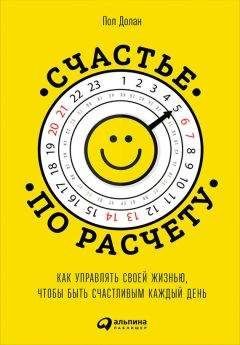Пол Долан - Счастье по расчету. Как управлять своей жизнью, чтобы быть счастливым каждый день

Помощь проекту
Счастье по расчету. Как управлять своей жизнью, чтобы быть счастливым каждый день читать книгу онлайн
DeVoe S.E., House J. Time, money, and happiness: how does putting a price on time affect our ability to smell the roses? Journal of Experimental Social Psychology 2012; 48: 466.
327
Aguiar M., Hurst E. Measuring trends in leisure: the allocation of time over five decades. Quarterly Journal of Economics 2007; 122: 969–1006.
328
Shah A.K., Mullainathan S., Shafir E. Some consequences of having too little. Science 2012; 338: 682–85.
329
Dolan P., Metcalfe R. With my money on my mind: income, happiness and intrusive financial thoughts. Unpublished working paper, 2011.
330
Smallwood J., Schooler J.W. The restless mind. Psychological Bulletin 2006; 132: 946.
331
Mason M.F., Norton M.I., Horn J.D.V., Wegner D.M., Grafton S.T., Macrae CN. Wandering minds: the default network and stimulus-independent thought. Science 2007; 315: 393–95.
332
Ziauddeen H., Farooqi I.S., Fletcher P.C. Obesity and the brain: how convincing is the addiction model? Nature Reviews Neuroscience 2012; 13: 279–86.
333
Killingsworth M.A., Gilbert D.T. A wandering mind is an unhappy mind. Science 2010; 330: 932.
334
Nolen-Hoeksema S., McBride A., Larson J. Rumination and psychological distress among bereaved partners. Journal of Personality and Social Psychology 1997; 72: 855–62.
335
Dolan P. Thinking about it: thoughts about health and valuing QALYs. Health Economics 2011; 20: 1407–16.
336
Gilkey J.G. You can master life. Macmillan, 1938.
337
Bennett P., Phelps C., Brain K., Hood K., Gray J. A randomized controlled trial of a brief self-help coping intervention designed to reduce distress when awaiting genetic risk information. Journal of Psychosomatic Research 2007; 63: 59–64.
338
Wood W., Quinn J.M., Kashy D.A. Habits in everyday life: thought, emotion, and action. Journal of Personality and Social Psychology 2002; 83: 1281–97.
339
Powers W. Hamlet’s BlackBerry. HarperCollins, 2011.
340
Spitzer M. Demencia digital (Digital dementia). Ediciones B, 2013.
341
Yuan K., Qin W., Wang G., et al. Microstructure abnormalities in adolescents with Internet addiction disorder. PloS ONE 2011; 6: e20708.
342
Hofmann W., Vohs K.D., Baumeister R.F. What people desire, feel conflicted about, and try to resist in everyday life. Psychological Science 2012; 23: 582–88.
343
Turkle S. Alone together: why we expect more from technology and less from each other. Basic Books, 2011.
344
Rothberg M.B., Arora A., Hermann J., Kleppel R., Marie P.S., Visintainer P. Phantom vibration syndrome among medical staff: a cross sectional survey. British Medical Journal 2010; 341.
345
The phone stacking game changes everything. Huffington Post, Oct. 1, 2012.
346
The communications market report. United Kingdom: a nation addicted to smartphones. OfCom, 2011.
347
The communications market report. United Kingdom: UK is now texting more than talking. OfCom, 2012.
348
Ferrari J.R., Harriott J.S., Zimmerman M. The social support networks of procrastinators: friends or family in times of trouble? Personality and Individual Differences 1998; 26: 321–31.
349
Borkovec T.D., Ray W.J., Stober J. Worry: a cognitive phenomenon intimately linked to affective, physiological, and interpersonal behavioral processes. Cognitive Therapy and Research 1998; 22: 561–76.
350
O’Donoghue T., Rabin M. Choice and procrastination. Quarterly Journal of Economics 2001; 116: 121–60.
351
Bui N.H. Effect of evaluation threat on procrastination behavior. Journal of Social Psychology 2007; 147: 197–209.
352
Jeanmonod R., Jeanmonod D., Ngiam R. Resident productivity: does shift length matter? American Journal of Emergency Medicine 2008; 26: 789–91.
353
Kahneman D., Tversky A. Intuitive prediction: biases and corrective procedures. DTIC Document, 1977.
354
Van Eerde W. A meta-analytically derived nomological network of procrastination. Personality and Individual Differences 2003; 35: 1401–18.
355
Buehler R., Griffin D., Ross M. Exploring the “planning fallacy”: why people underestimate their task completion times. Journal of Personality and Social Psychology 1994; 67: 366–81.
356
Amabile T.M., Hadley C.N., Kramer S.J. Creativity under the gun. Harvard Business Review 2002; 80: 52–61.
357
Frost R.O., Marten P., Lahart C., Rosenblate R. The dimensions of perfectionism. Cognitive Therapy and Research 1990; 14: 449–68.
358
Dolan P., Rudisill C. Babies in waiting: why increasing the IVF age cut-off is likely to lead to fewer wanted pregnancies. Under review, 2013.
359
Cadena X., Schoar A., Cristea A., Delgado-Medrano HM. Fighting procrastination in the workplace: an experiment. National Bureau of Economic Research, 2011.
360
Roy M., Christenfeld N., McKenzie C. Underestimating the duration of future events: memory incorrectly used or memory bias? Psychological Bulletin 2005; 131: 738–56.
361
Wohl M.J., Pychyl T.A., Bennett S.H. I forgive myself, now I can study: how self-forgiveness for procrastinating can reduce future procrastination. Personality and Individual Differences 2010; 48: 803–8.
362
Steel P. The nature of procrastination: a meta-analytic and theoretical review of quintessential self-regulatory failure. Psychological Bulletin 2007; 133: 65.
363
Shu S.B., Gneezy A. Procrastination of enjoyable experiences. Journal of Marketing Research 2010; 47: 933–44.
364
Ariely D., Wertenbroch K. Procrastination, deadlines, and performance: self-control by precommitment. Psychological Science 2002; 13: 219–24.
365
Kruger J., Evans M. If you don’t want to be late, enumerate: unpacking reduces the planning fallacy. Journal of Experimental Social Psychology 2004; 40: 586–98.
366
Duflo E., Saez E. The role of information and social interactions in retirement plan decisions: evidence from a randomized experiment. National Bureau of Economic Research, 2002.
367
Lee E. The relationship of motivation and flow experience to academic procrastination in university students. Journal of Genetic Psychology 2005; 166: 5–14; Read D., Loewenstein G., Kalyanaraman S. Mixing virtue and vice: combining the immediacy effect and the diversification heuristic. Journal of Behavioral Decision Making 1999; 12: 257–73.
368
Johns G., Jia Lin Xie, Yongqing Fang. Mediating and moderating effects in job design. Journal of Management 1992; 18: 657.
369
Lavoie J.A.A., Pychyl T.A. Cyberslacking and the procrastination superhighway: a web-based survey of online procrastination, attitudes, and emotion. Social Science Computer Review 2001; 19: 431–44.
370
Dolan P., Olsen J.A. Equity in health: the importance of different health streams. Journal of Health Economics 2001; 20: 823–34; Dolan P., Tsuchiya A. The social welfare function and individual responsibility: some theoretical issues and empirical evidence. Journal of Health Economics 2009; 28: 210–20.
371
Dolan P., Shaw R., Tsuchiya A., Williams A. QALY maximisation and people’s preferences: a methodological review of the literature. Health Economics 2005; 14: 197–208; Edlin R., Tsuchiya A., Dolan P. Public preferences for responsibility versus public preferences for reducing inequalities. Health Economics 2012; 21: 1416–26.
372
Amiel Y., Cowell F., Gaertner W. Distributional orderings: an approach with seven flavors. Theory and Decision 2012; 73: 381–99.
373
Dolan P., Edlin R., Tshuchiya, A. The relative societal value of health gains to different beneficiaries-final report. National Co-ordinating Centre for Research Methodology, 2008.
374
Dolan P., Robinson A. The measurement of preferences over the distribution of benefits: the importance of the reference point. European Economic Review 2001; 45: 1697–1709.
375
Clark A., Fleche S., Senik C. The great happiness moderation. IZA Discussion Paper No. 6761, 2012.
376
Alesina A., Di Tella R., MacCulloch R. Inequality and happiness: are Europeans and Americans different? Journal of Public Economics 2004; 88: 2009–42.
377
Oshio T., Kobayashi M. Income inequality, perceived happiness, and self-rated health: evidence from nationwide surveys in Japan. Social Science & Medicine 2010; 70: 1358–66; Jiang S., Lu M., Sato H. Identity, inequality, and happiness: evidence from urban China. World Development 2012; 40: 1190–1200; Graham C., Felton A. Inequality and happiness: insights from Latin America. Journal of Economic Inequality 2006; 4: 107–22.
378
Knight J., Song L. Subjective well-being and its determinants in rural China. China Economic Review 2009; 20; 635–49.
379
Meier S., Stutzer A. Is volunteering rewarding in itself? Economica 2008; 75: 39–59.
380
Dunn E.W., Aknin L.B., Norton M.I. Spending money on others promotes happiness. Science 2008; 319: 1687–88.
381
Mogilner C., Chance Z., Norton MI. Giving time gives you time. Psychological Science 2012; 23: 1233–38.
382
Cacioppo J.T., Fowler J.H., Christakis N.A. Alone in the crowd: the structure and spread of loneliness in a large social network. Journal of Personality and Social Psychology 2009; 97: 977–91.
383
Luo Y., Hawkley L.C., Waite L.J., Cacioppo J.T. Loneliness, health, and mortality in old age: a national longitudinal study. Social Science & Medicine 2012; 74: 907–14.
384
Andreoni J. Impure altruism and donations to public goods: a theory of warm-glow giving. Economic Journal 1990; 100: 464.
385
Докинз Р. Эгоистичный ген. – М.: АСТ, Corpus, 2014.
386
Wilkinson G.S. Reciprocal food sharing in the vampire bat. Nature 1984; 308: 181–84.
387
Lloyd K. Happiness and the wellbeing of young carers: extent, nature, and correlates of caring among 10 and 11 year old schoolchildren. Journal of Happiness Studies 2013; 14: 67–80.
388
Bourassa D. Examining self-protection measures guarding adult protective services social workers against compassion fatigue. Journal of Interpersonal Violence 2012; 27: 1699–1715.
























